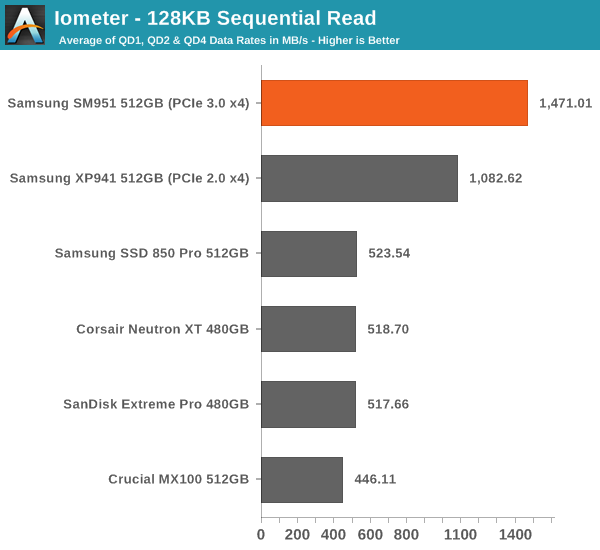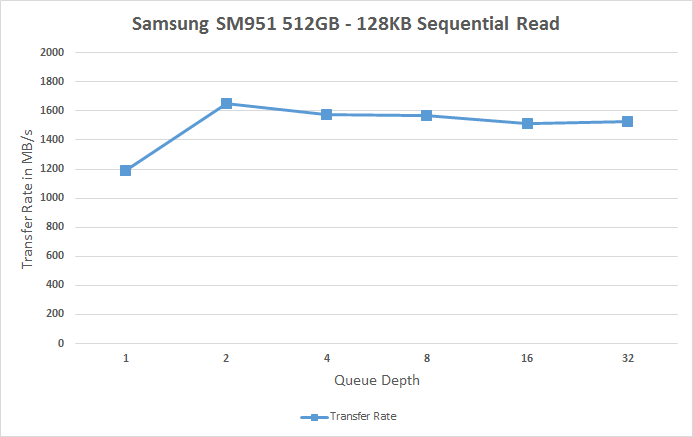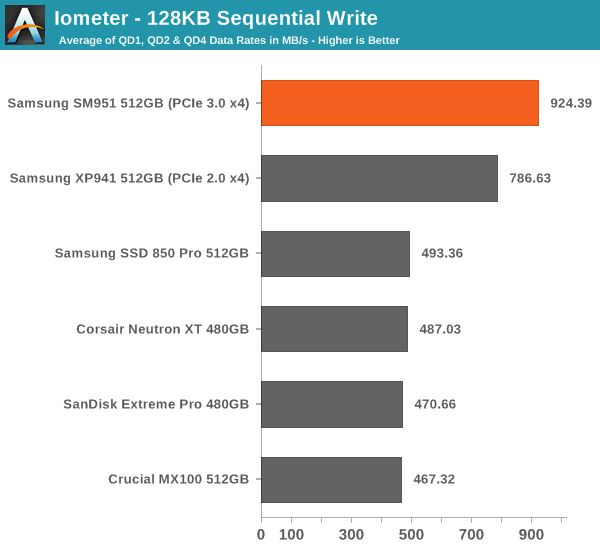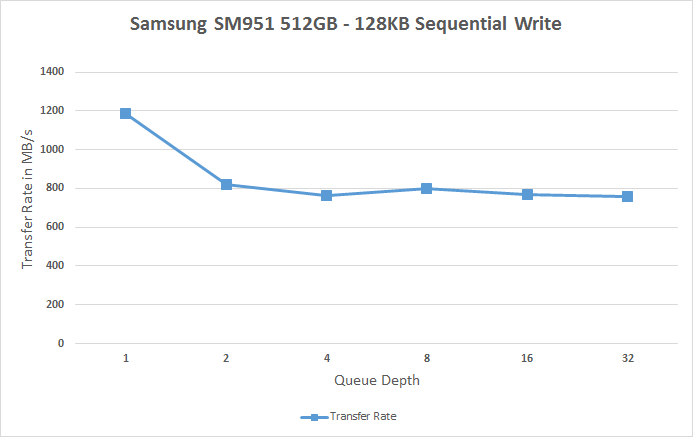Samsung SM951 (512GB) PCIe SSD Review
by Kristian Vättö on February 24, 2015 8:00 AM ESTSequential Read Performance
Our sequential tests are conducted in the same manner as our random IO tests. Each queue depth is tested for three minutes without any idle time in between the tests and the IOs are 4K aligned similar to what you would experience in a typical desktop OS.

The sequential tests really show the benefit of PCIe 3.0 because the SM951 is approximately three times faster than a SATA 6Gbps drive and provides a ~40% upgrade over the XP941.
 |
|||||||||
The line graph does reveal some anomalies, though. First it looks like the performance scales nicely, but after queue depth of two the performance actually degrades. I'm doing some thermal throttling tests later in the article and it's very likely that the read results are affected by that because I was able to reach 2250MB/s at queue depth of 32 with a cold drive (i.e. I went straight to QD32 without doing the scaling first that heats up the drive).
Sequential Write Performance
Sequential write testing differs from random testing in the sense that the LBA span is not limited. That's because sequential IOs don't fragment the drive, so the performance will be at its peak regardless.

Sequential performance is also great, but seems to be affected by thermal throttling even more. That said, I did reach over 1500MB/s with a cold drive.
 |
|||||||||










128 Comments
View All Comments
Kevin G - Tuesday, February 24, 2015 - link
"I also verified that the SM951 is bootable in tower Mac Pros (2012 and earlier)."Excellent. The old 2010/2012 towers continue to show that being expandable provides long term benefit. I'm glad that I picked up my tower Mac Pro when I did.
Now to find a carrier that'll convert the 4x PCIe 3.0 link of the M.2 connector to an 8x PCIe 2.0 link for a Mac Pro. (Two two M.2s to a single 16x PCIe 2.0 link.)
extide - Tuesday, February 24, 2015 - link
You will need a PLX chip to do that, you can't just put 2 x4 devices into an x8 slot...jimjamjamie - Wednesday, February 25, 2015 - link
It's pretty hilarious how many people drink the shiny plastic trash bin kool-aid.Tunnah - Tuesday, February 24, 2015 - link
I'm not super knowledgeable on the whole thing, but isn't NVMe really only a big deal for enterprise, as it's more a benefit for multi drive setups ?Kristian Vättö - Tuesday, February 24, 2015 - link
It's of course a bigger deal for enterprises because the need for performance is higher. However, NVMe isn't just a buzzword for the client space because it reduced the protocol latency, which in turn results in higher performance at low queue depths that are common for client workloads.knweiss - Sunday, March 1, 2015 - link
Kristian, did you ever test how much influence the filesystem has? I would love to see a filesystem comparison on the various platforms with NVMe drivers (Windows, Linux, FreeBSD, etc).The_Assimilator - Tuesday, February 24, 2015 - link
Hopefully NVMe will be standard on SSDs by the time Skylake and 100-series chipsets arrive.sna1970 - Tuesday, February 24, 2015 - link
What is the point of this expensive drive when you can have the same numbers using 2 SSD in Raid 0 ?and please no one says to me risk of Data Loss .. SSD are not mechanical and the chance of loosing 1 SSD is the same of 2 of them.
Kristian Vättö - Tuesday, February 24, 2015 - link
RAID only tends to increase high QD and large IO transfers where the IO load can easily be distributed between two or more drives. Low QD performance at small IO sizes can actually be worse due to additional overhead from the RAID drivers.dzezik - Tuesday, February 24, 2015 - link
Hi sna1970. You misses Bernouli's "introduced the principle of the maximum product of the probabilities of a system of concurrent errors" it is quite old 1782 but is is still valid. Have You ever been in school. Do You have mathematics classes?